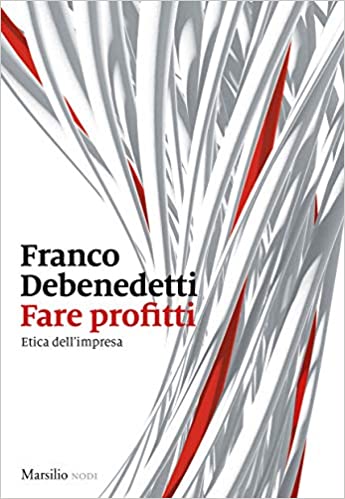![]()
Ben scavato, vecchia talpa!”, dicevano una volta i compagni. Adesso il comunismo è morto, e neanche la talpa si sente più tanto bene. Viene in mente leggendo che Enel, municipalizzate, Terna, alla notizia che Matteo Renzi è disposto a mettere soldi pubblici per dare a tutti gli italiani la banda larghissima, si son fatti avanti per dare una mano al premier per vincere la cocciutaggine di Telecom Italia. Tutti telefonisti? Manco per sogno, tutte talpe, tutti scavatori di cunicoli per i loro cavi dell’energia elettrica. Farci passare anche la fibra non costa molto, e con un po’ di soldi dal governo, un po’ da Telecom che dovrà connetterla alla sua rete, ci si può cavare la giornata: e far contento il governo.
leggi il resto ›
![]()
Piazzetta Cuccia si chiamava Via Filodrammatici, Antonio Fazio in Banca d’Italia amministrava il suo piano regolatore, le Fondazioni erano al massimo della loro ricchezza: era il capitalismo relazionale, e noi gli si scriveva contro. Non è certo perché in disaccordo col principio che si è rimasti più che perplessi quando Matteo Renzi, parlando a banchieri e imprenditori venuti ad ascoltarlo a Palazzo Mezzanotte, ha accusato “quel sistema che poneva la relazione come elemento chiave di un paese in cui giornali, banche, imprese, fondazioni bancarie, partiti politici hanno pensato che si potesse andare avanti tutti insieme dialogando e discutendo”. Se, come ha detto, “è morto”, perché maramaldeggiare?
leggi il resto ›
Chissà se nella riunione straordinaria del 23 aprile del Consiglio d’Europa per la “drammatica situazione nel Mediterraneo” si è parlato anche della sua straordinarietà. Sarebbe bastato guardare i numeri: nel periodo 2010-2014, mentre gli stranieri registrati nelle anagrafi comunali sono aumentati in misura modesta (20 per cento circa) e gli ospitati nei centri di accoglienza sono poco più che raddoppiati, coloro che sono sbarcati sulle coste italiane sono quasi 40 volte tanto. Per il 2015, l’aumento del 40 per cento registrato a tutto febbraio rispetto all’anno precedente, tenuto conto della stagionalità, lascia prevedere cifre inquietanti. La cifra del milione di persone che attendono di partire non è ancora una proiezione, ma non è più un’esagerazione. La drammatica differenza nei tassi di crescita indica che ci sono due tipologie di immigrazione, cioè che ai migranti “economici” si vanno progressivamente sostituendo i fuggitivi da guerre e sconvolgimenti politici. Dei 170 mila sbarcati nel 2014, 42.323 venivano dalla Siria, 34.329 dall’Eritrea, 9.908 dal Mali, 9 mila dalla Nigeria: l’aumento del flusso è tutto composto da persone che provengono da paesi devastati da crisi sanguinose.
leggi il resto ›
![]()
Qual è la vera consistenza della contrapposizione tra Commissione e Consiglio Europeo da un lato e governo greco dall’altro, che venerdì è tornata a far ballare i mercati con le Borse europee in rosso e lo spread tra Btp italiani e Bund tedeschi che ha lambito quota 150? Si trattasse di una questione economica, in un modo o nell’altro sarebbe già stata risolta: è chiaro che nessuno, tanto meno la cancelliera tedesca Angela Merkel, può accettare di avere più fronti aperti contemporaneamente, e che Ucraina e Stato islamico (Is) hanno peso e urgenza ancora maggiori.
leggi il resto ›

Sir,
No doubt, “if Greece does fall out of the euro, it will also fall out of Europe”, as Philip Stephens writes (“Europe faces more than a Greek tragedy”, April 10). No doubt, “the failure of the euro would mark the failure of Europe”. But there is no link between the two statements, namely that Greece falling out of the euro marks the failure of the euro. This would be the case should it happen for economic reasons: too high the cost, too vague the reforms, too big the risk. As a consequence the euro would not be perceived any more as a monetary union, but as a fixed exchange rate area, the markets would soon attack the weakest countries, the spread would rise, sooner or later there would be a second Greece.
leggi il resto ›

by Philip Stephens
The pilgrimage of Greek prime minister Alexis Tsipras to Moscow told a tale of two tragedies. One, perilously close to the denouement, is about Greece’s uncertain place in the family of European nations; the other, still unfolding but with a storyline that foretells a calamitous final act, is about the future not just of the euro but of European integration.
Predictably enough, the Greek prime minister was feted by Vladimir Putin. The Russian president’s revanchist aggression in Ukraine has left his regime more vulnerable than anyone in the Kremlin would dare admit. Mr Putin badly needs to weaken the EU sanctions regime. Shared Orthodox Christianity, an air of leftist nostalgia in Athens and, above all, Greece’s desperate isolation make it an ideal target for Moscow’s strategy of divide and rule.
It is harder to see what Mr Tsipras gains beyond a few warm words to cheer his supporters at home. The promise of a gas pipeline years hence? Any aid on offer from Moscow would be minuscule relative to funds from the EU and the International Monetary Fund. There is nothing Mr Putin could do that would make leaving the euro any less painful.
The other day I heard Yanis Varoufakis explain how Greece had ended up here. The finance minister’s is a story fluently told — of US backing for the colonels, of the havoc wreaked on industry by the free trade rules of the EU, of the Brussels funding that bankrolled clientelist politics in Athens and of how cheap euros created a ruinous bubble.
There are elements of truth in this; and Mr Varoufakis is right when he says the present debt burden is unsustainable. Missing from the narrative, though, is any sense that Greece must make its own choices. That, whatever the sins of others, only Athens can decide whether Greece prospers as a modern democracy or whether it slips back into the shadows of the Balkans.
The omission, and the implicit rebuke to outsiders who do not feel bound by ballots cast by Greeks, is at the heart of what so frustrates Athens’ partners. This is not just about the Germans, even if Wolfgang Schäuble, Berlin’s finance minister, foolishly lends credibility to the idea. Mr Tsipras is isolated among fellow debtors as much as creditors. What unites them is a demand that Athens produce a plausible plan to reform the Greek state — to modernise its administration and politics as much as its economy. Such a plan would transform the mood of negotiations.
Mr Putin’s preference is otherwise. A collapse in Greek living standards would leave it ripe for the coercion and subversion that are Russia’s trademarks in an effort to expand its influence and control in southeastern Europe. The Russian president already has Hungary’s prime minister Viktor Orban in his breast pocket. His agents are working hard — exploiting Russia’s energy monopoly, buying politicians, bribing officials and taking stakes in financial institutions — to promote instability across the Balkans.
Yet talk to finance ministers and central bankers across the rest of Europe and the mood is one of fatalism. They will tell you that the eurozone would withstand Greece’s departure. This is not 2008, or even 2012, they say. Governments have put in place the mechanisms to deal with crises. Some sound as if they believe that, freed from the vicissitudes of Greek politics, the euro would be stronger in the long run.
In a narrow sense they may be right, though I would not bet on it. But Greece is a distorting prism. Its sequential crises have bred complacency by distracting from the profound structural flaws and political challenges that still imperil the euro. Making monetary union work demands more than proficient crisis management.
Spring has seen a burst of sunshine in the European economy. The European Central Bank’s quantitative easing is having an effect. Growth has picked up a little. Yet it is a delusion to think that the euro is in safe harbour. Fiscal and financial union are at best half-completed, and the political threat to the euro continues to grow.
National politicians refuse to admit the supranational imperatives of the project they are pledged to safeguard. And a return to growth rates of 1 or even 2 per cent will not be enough to restore the euro’s legitimacy among the angry voters who are turning to populist movements of right and left.
In 2012, European leaders defied the markets by summoning up the political resolve needed to save the single currency. They have since lost the will to sustain it. Greece may not bring down the euro; the existential threat lies in the more generalised failure of nerve and leadership.
So it is, too, in the relationship with Moscow. The biggest danger to Europe comes not from the forays of Mr Putin’s rusting aircraft carrier, or his cold war-vintage nuclear bombers, or from Soviet-style subversion in some of the darker corners of the continent.
No, the real weakness lies in a European mindset that prefers to temporise and equivocate than to confront Mr Putin head on. Mr Tsipras’s visit may have held up a mirror to Greece’s troubles. But it also offered a reflection of diffidence and division across Europe. If Greece does fall out of the euro it will also fall out of Europe. And the failure of the euro would mark the failure of Europe. What unites these twin tragedies is the stubborn reluctance of the authors to rewrite the endings.






